In God We Trust
"In God We Trust", also "In God we trust", is the official motto of the United States of America[1][2][3] and of the U.S. state of Florida. It was adopted by the U.S. Congress in 1956, supplanting E pluribus unum, which had been in use since the initial 1776 design of the Great Seal of the United States.[4]
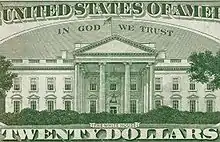
The capitalized form "IN GOD WE TRUST" first appeared on the two-cent piece in 1864[5] and has appeared on paper currency since 1957. A law passed in a Joint Resolution by the 84th Congress (Pub.L. 84–140) and approved by President Dwight Eisenhower on July 30, 1956, requires that "In God We Trust" appear on American currency. The following year, the phrase was used on paper money for the first time—on the updated one-dollar silver certificate that entered circulation on October 1, 1957.[5] The 84th Congress later passed legislation (Pub.L. 84–851), also signed by President Eisenhower on July 30, 1956, declaring the phrase to be the national motto.[6][7][8]
Some groups and people have objected to its use, contending that its religious reference violates the Establishment Clause of the First Amendment.[9] These groups believe the phrase should be removed from currency and public property. In lawsuits, this argument has not overcome the interpretational doctrine of accommodationism, which allows government to endorse religious establishments as long as they are all treated equally.[10] According to a 2003 joint poll by USA Today, CNN, and Gallup, 90% of Americans support the inscription "In God We Trust" on U.S. coins.[11]
In 2006, "In God We Trust" was designated as the motto of the U.S. state of Florida.[12][13]
The Spanish equivalent of "In God We Trust", En Dios Confiamos, is the motto of the Republic of Nicaragua.[14] The heraldic motto of Brighton, England was (until 1997) the Latin equivalent, In Deo Fidemus.[15][16]
History


.jpg.webp)
In 1814, Francis Scott Key composed and published a poem entitled "Defence of Fort M'Henry". In the fourth verse, Key's published version of the poem includes the line, "And this be our motto-"In God is our trust!""[18] Key's poem would later be adopted as the national anthem of the United States under the name "The Star-Spangled Banner". In 1956 when 'In God We Trust' was under consideration to be adopted as the national motto of the United States by the US Congress, the words of the fourth verse of "The Star Spangled Banner" were brought up in arguments supporting adoption of the motto.[19]
In 1860, the phrase was used in the coat of arms of New Westminster, Canada. During the American Civil War, the 125th Pennsylvania Infantry for the Union Army assumed the motto "In God we trust" in early August 1862.[20][21][22] William W. Wallace, coiner, circa August 1862, of the motto "In God We Trust"[23] was Captain of Company C of the 125th Pennsylvania Infantry.
The Reverend Mark R. Watkinson of Ridleyville, Pennsylvania, (pastor of Prospect Hill Baptist Church in present-day Prospect Park, Pennsylvania) in a letter dated November 13, 1861, petitioned the Treasury Department to add a statement recognizing "Almighty God in some form on our coins" in order to "relieve us from the ignominy of heathenism".[24][25][26] At least part of the motivation was to declare that God was on the Union side of the Civil War.[27] Treasury Secretary Salmon P. Chase acted on this proposal and directed the then-Philadelphia Director of the Mint and member of the National Reform Association, James Pollock, to begin drawing up possible designs that would include the religious phrase.[26] Chase chose his favorite designs and presented a proposal to Congress for the new designs in late 1863,[28] deciding on the new motto, "In God We Trust," in December 1863.
Chase was Abraham Lincoln's Secretary of the Treasury. Lincoln's involvement in this decision is unclear.[29]
A version of the motto made an early appearance on obverse side of the twenty dollar interest-bearing note issued in 1864 along with the motto "God and our Right".
As Chase was preparing his recommendation to Congress, it was found that the Act of Congress dated January 18, 1837, prescribed the mottoes and devices that should be placed upon the coins of the United States. This meant that the mint could make no changes without the enactment of additional legislation by Congress. Such legislation was introduced and passed as the Coinage Act of 1864 on April 22, 1864, allowing the Secretary of the Treasury to authorize the inclusion of the phrase on one-cent and two-cent coins.[27]
An Act of Congress passed on March 3, 1865, allowed the Mint Director, with the Secretary's approval, to place the motto on all gold and silver coins that "shall admit the inscription thereon".[27][30] In 1873, Congress passed the Coinage Act, granting that the Secretary of the Treasury "may cause the motto IN GOD WE TRUST to be inscribed on such coins as shall admit of such motto".
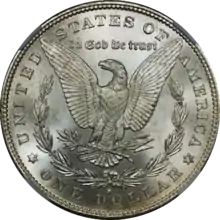
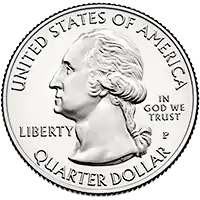
After use of the motto on coins began during the 1860s, there have been some coins on which the motto did not appear. The motto disappeared from the new Liberty Head nickel in 1883, and did not reappear until production of the Jefferson nickel began in 1938.[27] However, at least two other coins minted in every year in the interim still bore the motto, including the Morgan dollar and the Seated Liberty half dollar. The omission of the motto "In God We Trust" on the Indian Head eagle coin caused public outrage, and prompted Congress to pass a bill mandating its inclusion. Mint Chief Engraver Charles E. Barber added the words and made minor modifications to the design. In 1908, Congress made it mandatory that the phrase be printed on all coins upon which it had previously appeared. This decision was motivated after a public outcry following the release of a $20 coin which did not bear the motto.[31] The motto has been in continuous use on the one-cent coin since 1909, and on the ten-cent coin since 1916. It also has appeared on all gold coins and silver dollar coins, half-dollar coins, and quarter-dollar coins struck since July 1, 1908.[27] Since 1938, all US coins have borne the motto.[5]
During the Cold War era, the government of the United States sought to distinguish itself from the Soviet Union, which promoted state atheism and thus implemented antireligious legislation.[32] The 84th Congress passed a joint resolution "declaring IN GOD WE TRUST the national motto of the United States". The resolution passed both the House and the Senate unanimously and without debate.[33][34] H.R. 619, a bill that required that the inscription "In God we trust" appear on all paper and coin currency, was signed into law by President Eisenhower on July 30, 1956.[35][36] The United States Code at 36 U.S.C. § 302, now states: "'In God we trust' is the national motto."
On paper currency, it first appeared on the silver certificate in 1957, followed by other certificates. Federal Reserve Notes and United States Notes were circulated with the motto starting from 1964 to 1966, depending on the denomination.[27][37] (Of these, only Federal Reserve Notes are still circulated.)
Representative Charles Edward Bennett of Florida cited the Cold War when he introduced the bill in the House, saying "In these days when imperialistic and materialistic communism seeks to attack and destroy freedom, we should continually look for ways to strengthen the foundations of our freedom". [38][39]
Aronow v. United States was the first case to challenge the inclusion of "In God We Trust" on U.S. currency.[40] The law it challenged was "31 U.S.C. § 324a "the inscription 'In God we Trust'...shall appear on all United States currency and coins".[40] O'Hair v. Blumenthal (1978) challenged the inclusion of the phrase "In God We Trust" on U.S. currency. A similar decision was reached by the Fifth Circuit in Madalyn Murray O'Hair vs W. Michael Blumenthal in 1979, which affirmed that the "primary purpose of the slogan was secular".[41]
In March 2001, Governor of Mississippi Ronnie Musgrove signed legislation requiring the motto "In God We Trust" to be displayed in every public school classroom, as well as the school auditoriums and cafeterias, throughout the state.[42][43]
After the September 11 attacks in 2001, many public schools across the United States posted "In God We Trust" framed posters in their "libraries, cafeterias and classrooms". The American Family Association supplied several 11-by-14-inch posters to school systems and vowed to defend any legal challenges to the displaying of the posters.[44]
According to a 2003 joint poll by USA Today, CNN, and Gallup, 90% of Americans support the inscription "In God We Trust" on U.S. coins.[11]
In 2006, on the 50th anniversary of its adoption, the Senate reaffirmed "In God We Trust" as the official national motto of the United States of America.[45] In Florida House Bill no. 1145, Florida adopted 'In God We Trust' as the official state motto, effective July 1, 2006.[12][13]
In 2011 the House of Representatives passed an additional resolution reaffirming "In God We Trust" as the official motto of the United States, in a 396–9 vote.[46][47]
In 2013, a federal court rejected a challenge, brought by Michael Newdow and the Freedom From Religion Foundation, to remove "In God We Trust" from American currency.[48]
.svg.png.webp)
On January 31, 2014, purporting to defend religious freedom, the Mississippi senate voted to add the words, "In God We Trust" to the state seal and the change was made effective on July 1, 2014.[49][50]
In 2015 the county police department of Jefferson County, Illinois announced that the words "In God We Trust" will be on police squad cars.[51] In 2015, the Freedom from Religion Foundation demanded that local authorities remove decals of the motto from Childress, Texas Police Department patrol vehicles. In response, Police Chief Adrian Garcia told the organization, in a written letter, to "go fly a kite."[52]
In March 2017, Act 911, sponsored by State Rep. Jim Dotson, made it a requirement of Arkansas state law for schools to display posters with the national motto ("In God We Trust").[53][54]
Also in March, the same requirement was enacted[55] in Kentucky schools for the 2019–2020 school year requiring the slogan to be displayed "in a prominent location." To protest the requirement, Fayette County Public Schools (Kentucky) in Lexington, KY complied by posting a framed United States one-dollar bill which bears the slogan.[56]
In early 2018, Kimberly Daniels, a pastor[57] who currently serves as the representative for Florida House of Representatives District 14 as a member of the Democratic Party, introduced HB 839, a bill that requires public schools to display the motto "In God We Trust" in a conspicuous place. On Tuesday, January 23, 2018, the bill received unanimous approval from the House PreK-12 Innovation Subcommittee.[58] Later, in a vote on February 21, 2018, the bill passed 97 to 10 in the House.[59][60] As part of Florida's March 2018 K-12 education law, Gov. Rick Scott mandated that all public schools post the state motto ("In God We Trust") in a prominent location.[61]
In March 2018, a bill requiring Tennessee schools to prominently display the national motto ("In God We Trust") sponsored by Rep. Susan Lynn passed the state House with 81 of the 99 members voting in favor of it.[62]
In June 2019, the Bakersfield, California City Council voted 4–2 to put an "In God We Trust" sticker on the city's police and fire vehicles. The issue was debated for two hours by 19 people including a lawyer from the ACLU.[63]
Also in 2019, South Dakota[64][65][66] and Louisiana[64][67] passed bills that require public schools to display the motto "In God We Trust".
On March 3, 2020, the Oklahoma House of Representatives passed a bill that would require public buildings in the state to display In God We Trust.[68]
Later that year, on June 30, Mississippi Governor Tate Reeves signed into law a bill requiring that the state's flag, which had contained the Confederate battle emblem, be replaced with a new one containing the phrase "In God we trust." Preliminary designs for the new flag are expected to be introduced to the public on September, 2020.[69]
As of 2020 Kansas, Indiana, and Oklahoma are looking at similar bills.[70][71][72]
Society and culture
Religion
In Judaism and Christianity, the official motto "In God We Trust" is not found verbatim in any verses from the Bible, but very closely in the Old Testament in Psalm 91:2, "I will say of the LORD, He is my refuge and my fortress: my God; in him will I trust" and in the New Testament in 2 Corinthians 1:10, "Who delivered us from so great a death, and doth deliver: in whom we trust that he will yet deliver us." The concept is paraphrased in Psalm 118:8, Psalm 40:3, Psalm 73:28, and Proverbs 29:25.[73] In Islam the word for the concept of reliance on God is called Tawakkul; the phrase "In God We Trust" is literally found in two places of the Quran, in Surah 10 Yunus, as well as Surah Al-A'raf (7:89), and several other verses reinforce this concept.[74] Melkote Ramaswamy, a Hindu American scholar, writes that the presence of the phrase "In God We Trust" on American currency is a reminder that "there is God everywhere, whether we are conscious or not."[75]
In popular culture
An e-mail conspiracy theory is that "In God We Trust" was intentionally omitted from new U.S. dollar coins in 2007.[76] The first coins produced under the Presidential $1 Coin Program did lack the "In God We Trust" inscription along their edges (along with the "E Pluribus Unum" inscription, the year of production, and the mint mark; these coins, unlike normal dollar coins, had completely blank edges), but these coins, known as "godless dollars", were the result of a minting error, not a deliberate omission.[77][78]
In January 2006, Laurence Llewelyn-Bowen and his wife Jackie were offered a place on the Valentine's Day celebrity couples edition of Who Wants to Be a Millionaire? They appeared on the show managing to reach the £1 million question, before answering it incorrectly and dropping from £500,000 down to just £32,000 (a loss of £468,000). Celador allowed Llewelyn-Bowen and his wife to retry the show after the company claimed that the last question "didn't meet their standards". The allegedly misleading question was "Translated from the Latin, what is the motto of the United States?" The answer given by Llewelyn-Bowen was "In God We Trust" which is originally English and has been the motto of the United States since 1956. The intended answer had been "One Out of Many" which is a translation of the Latin phrase E pluribus unum, which is not the current United States motto. E pluribus unum had been the de facto motto but was never legally declared.[79]
In 1988 Stryper released their fourth studio album In God We Trust.
License plates
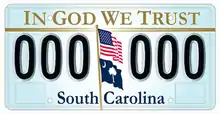
As of April 1, 2016 the following U.S. states currently offer an "In God We Trust" license plate as a specialty plate for an additional normal vehicle registration processing which vary from state to state: Alaska, Arizona, Arkansas, Florida, Indiana, Kansas, Kentucky, Louisiana, North Carolina, Ohio,[80] Oklahoma, Pennsylvania, South Carolina, Tennessee, Texas, Utah, Virginia, West Virginia, and Wisconsin.
Florida – which also offers a specialty plate – and Georgia which both display the county of issuance on their license plate offer the option of "In God We Trust" in place of the county name.
Criticism
The constitutionality of the phrase "In God We Trust" has been upheld according to the judicial interpretation of accommodationism, whose adherents state that this entrenched practice has not historically presented any constitutional difficulty, is not coercive, and does not prefer one religious denomination over another.[81] In Zorach v. Clauson (1952), the Supreme Court also wrote that the nation's "institutions presuppose a Supreme Being" and that government recognition of God does not constitute the establishment of a state church as the Constitution's authors intended to prohibit.[82]
On the other hand, advocates of separation of church and state have questioned the legality of this motto asserting their opinion that it is a violation of the United States Constitution, prohibiting the government from passing any law respecting an establishment of religion.[81] As such "In God We Trust" as a national motto and on U.S. currency has been the subject of numerous unsuccessful lawsuits by these individuals.[83] The motto was first challenged in Aronow v. United States in 1970, but the United States Court of Appeals for the Ninth Circuit ruled: "It is quite obvious that the national motto and the slogan on coinage and currency 'In God We Trust' has nothing whatsoever to do with the establishment of religion. Its use is of patriotic or ceremonial character and bears no true resemblance to a governmental sponsorship of a religious exercise."[84] In Lynch v. Donnelly (1984), the Supreme Court wrote that acts of "ceremonial deism" are "protected from Establishment Clause scrutiny chiefly because they have lost through rote repetition any significant religious content".[85]
In June 2006, a federal judge rejected Michael Newdow's Establishment Clause lawsuit on the grounds that the minted words amount to a secular national slogan, and do not dictate anyone's beliefs. Newdow stated that he would appeal the ruling,[86] although Aronow was decided on the same grounds in the Ninth Circuit and the lower court was required to return the same ruling, likewise the Ninth Circuit does not traditionally overrule previous Ninth Circuit rulings. On December 4, 2007, Newdow argued before a three-judge panel of the Ninth Circuit to remove both "under God" from the Pledge of Allegiance (Roe v. Rio Linda Union School District), and "In God We Trust" from United States currency.[87] The Ninth Circuit rejected Newdow's challenge. In a decision published March 11, 2010, the court held that its earlier decision in Aronow, which "held the national motto is of a "patriotic or ceremonial character," has no "theological or ritualistic impact," and does not constitute "governmental sponsorship of a religious exercise," foreclosed Newdow's argument.[88] In an opinion concurring only in the judgment, even Judge Stephen Reinhardt[89] agreed that Aronow was controlling precedent.[90] Newdow v. Congress, 598 F.3d 638 (9th Cir. 2010) cert. denied 131 S. Ct. 1612 (U.S. 2011). AKA: The "In God We Trust Case" – A prominent atheist, Michael Newdow, filed a suit to declare the national motto – In God We Trust – unconstitutional and to have it removed from coins and currency.[91][92][93] Pacific Justice Institute intervened as a defendant and defended against the suit.[91][92][93] The case was dismissed by the trial court and the Ninth Circuit affirmed that decision.[91][92][93]
In 2015, New Jersey state judge David F. Bauman dismissed a case against the Matawan-Aberdeen Regional School District brought by a student of the district and the American Humanist Association that argued that the phrase "under God" in the Pledge of Allegiance created a climate of discrimination because it promoted religion, making non-believers "second-class citizens".[94][95] He noted; "As a matter of historical tradition, the words 'under God' can no more be expunged from the national consciousness than the words 'In God We Trust' from every coin in the land, than the words 'so help me God' from every presidential oath since 1789, or than the prayer that has opened every congressional session of legislative business since 1787."
In November 1907, sitting U.S. President Theodore Roosevelt took issue with using the motto on American coinage considering its usage "dangerously close to sacrilege":
My own feeling in the matter is due to my very firm conviction that to put such a motto on coins, or to use it in any kindred manner, not only does no good, but does positive harm, and is in effect irreverence, which comes dangerously close to sacrilege. ... Any use which tends to cheapen it, and, above all, any use which tends to secure its being treated in a spirit of levity, is from every standpoint profoundly to be regretted. ... it seems to me eminently unwise to cheapen such a motto by use on coins ... In all my life I have never heard any human being speak reverently of this motto on the coins or show any signs of its having appealed to any high emotion in him, but I have literally, hundreds of times, heard it used as an occasion of and incitement to ... sneering ... Every one must remember the innumerable cartoons and articles based on phrases like 'In God we trust for the 8 cents,' ... Surely, I am well within bounds when I say that a use of the phrase which invites constant levity of this type is most undesirable.
— President Theodore Roosevelt, November 1907[96]
Gallery
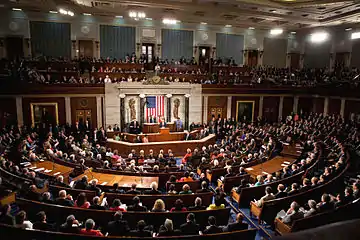 "IN GOD WE TRUST" motto over the tribune in the United States House of Representatives Chamber (between the clock and the flag)
"IN GOD WE TRUST" motto over the tribune in the United States House of Representatives Chamber (between the clock and the flag).jpg.webp) Indian Head eagle, revised design of 1908 adding "IN GOD WE TRUST" motto to reverse
Indian Head eagle, revised design of 1908 adding "IN GOD WE TRUST" motto to reverse Dollar coin stack showing "IN GOD WE TRUST" on edge
Dollar coin stack showing "IN GOD WE TRUST" on edge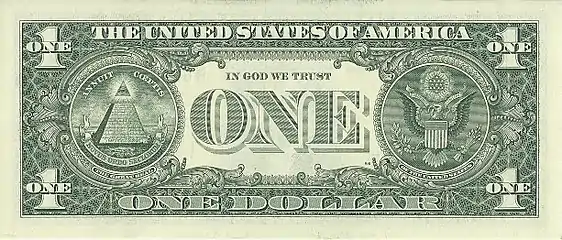 United States one-dollar bill, reverse, series 2009 with "IN GOD WE TRUST" motto
United States one-dollar bill, reverse, series 2009 with "IN GOD WE TRUST" motto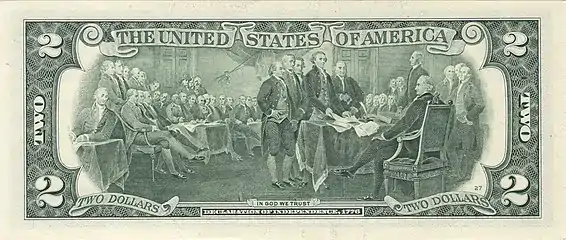 United States two-dollar bill, reverse, series 2003A
United States two-dollar bill, reverse, series 2003A 2013 Lincoln cent obverse
2013 Lincoln cent obverse.jpg.webp) Saint-Gaudens double eagle, revised design of 1908 adding "IN GOD WE TRUST" motto to reverse
Saint-Gaudens double eagle, revised design of 1908 adding "IN GOD WE TRUST" motto to reverse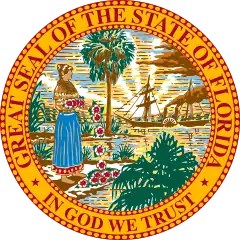 Seal of Florida with "IN GOD WE TRUST" motto
Seal of Florida with "IN GOD WE TRUST" motto.svg.png.webp) Seal of Mississippi with "IN GOD WE TRUST" motto
Seal of Mississippi with "IN GOD WE TRUST" motto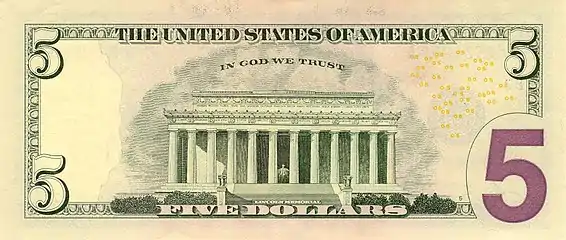 United States five-dollar bill, reverse, series 2006
United States five-dollar bill, reverse, series 2006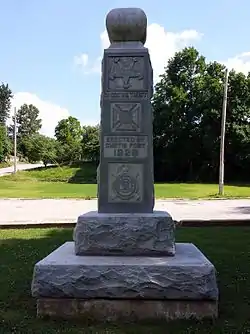 Grand Army of the Republic Memorial (Siloam Springs, Arkansas) engraved with the words "IN GOD WE TRUST"
Grand Army of the Republic Memorial (Siloam Springs, Arkansas) engraved with the words "IN GOD WE TRUST"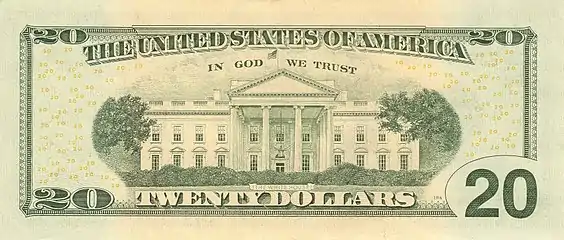 United States twenty-dollar bill, reverse
United States twenty-dollar bill, reverse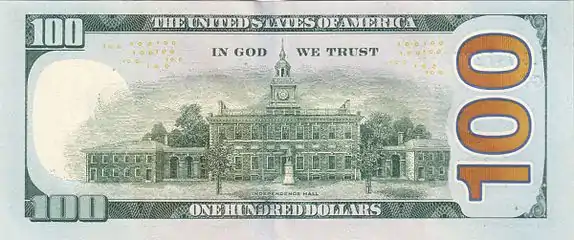 United States one hundred-dollar bill, reverse, series 2009
United States one hundred-dollar bill, reverse, series 2009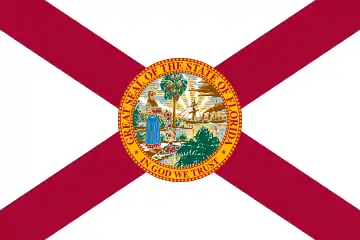
.svg.png.webp)
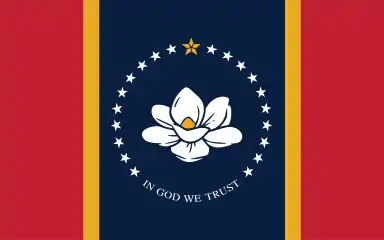
See also
- Deus seja louvado
- Dieu et mon droit
- God Save the Queen
- God zij met ons
- Gott mit uns
- In God We Trust: All Others Pay Cash
- List of Florida state symbols
- May God have mercy upon your soul
- National symbols of the United States
- Religion in the United States
- So help me God
- Trust in God and keep your powder dry
References
- "H. CON. RES. 13" (PDF). Archived (PDF) from the original on 12 May 2019. Retrieved 13 May 2019.
Reaffirming ‘‘In God We Trust’’ as the official motto of the United States
- "Title 36 – Patriotic and National Observances, Ceremonies, and Organizations". U.S. Government Publishing Office. Archived from the original on 12 May 2019. Retrieved 12 May 2019.
§302. National motto "In God we trust" is the national motto.
- "36 U.S. Code § 302. National motto". LII / Legal Information Institute. Archived from the original on 7 February 2019. Retrieved 12 May 2019.
“In God we trust” is the national motto.
- Bittker, Boris; Idleman, Scott; Ravitch, Frank (2015). Religion and the State in American Law. Cambridge University Press. p. 136. ISBN 9781107071827.
- U.S. Department of the Treasury (2011). "History of 'In God We Trust'". www.treasury.gov. Archived from the original on 2016-04-17. Retrieved 2017-03-14.
- 36 U.S.C. § 302 National motto
- "U.S. on the History of "In God We Trust"". United States Department of the Treasury. Archived from the original on 2015-04-17. Retrieved 2009-04-22.
- United States Public Law 84-851 Archived 2018-07-05 at the Wayback Machine, United States Public Law 84-851.
- "Atheist in battle to remove 'In God We Trust' from US currency". Telegraph. London. 2010-03-12. Archived from the original on 31 October 2013. Retrieved 2014-02-04.
- Drakeman, Donald L. (1 January 1991). Church-state Constitutional Issues: Making Sense of the Establishment Clause. Greenwood Press. ISBN 9780313276637.
- "USA TODAY/CNN/Gallup Poll results". USA Today. 2011. Retrieved 15 November 2011.
C. The inscription "In God We Trust" on U.S. coins; 2003 Sep 19–21; Approve 90; Disapprove 8; No opinion 2
- http://www.n-state.com, NSTATE, LLC. "Florida State Motto In God We Trust". www.netstate.com. Archived from the original on 2017-06-14. Retrieved 2018-02-24.
- "State Motto – Florida Department of State". dos.myflorida.com. Archived from the original on 2018-02-16. Retrieved 2018-02-24.
- As shown on the Córdoba (bank notes and coins); see for example Banco Central de Nicaragua Archived 2012-05-06 at the Wayback Machine
- Limited, Alamy. "Stock Photo - The coat of arms of Brighton with Motto: 'IN DEO FIDEMUS' - We trust in God on wall, Brighton, East Sussex, England UK in April". Alamy. Archived from the original on 2019-06-03. Retrieved 2019-06-03.
- "The Brighton & Hove crest | Brighton & Hove City Council". www.brighton-hove.gov.uk. Retrieved 2020-08-12.
- Chase, Salmon P (December 9, 1863). Letter to James Pollock. Document # RG 104_UD 87-A_Folder In God We Trust 1861_Part1. National Archives and Records Administration. p. 11.
- "Defence of Fort M'Henry". The Analectic Magazine. 4: 433–434. November 1814. hdl:2027/umn.31951000925404p.
- Fisher, Louis; Mourtada-Sabbah, Nada (2002). "Adopting In God We Trust as the U.S. National Motto". Journal of Church and State. 44 (4): 682–83. doi:10.1093/jcs/44.4.671 – via HeinOnline.CS1 maint: uses authors parameter (link) (Referencing H. Rept. No. 1959, 84th Cong., 2d Sess. (1956) and S. Rept. No. 2703, 84th Cong., 2d Sess. (1956), 2.)
- The Regimental Committee, 125th PA Volunteers, 1862–1863 (2009). Regimental History. Ithaca, NY: Cornell University Library. pp. 150–152. ISBN 978-1-112-13570-5.
- Alexander, ted (2011). The Battle of Antietam. Charleston, SC: The History Press. p. 76. ISBN 978-1-60949-179-6.
- 125th PA Vol. Infantry: IN GOD WE TRUST. YouTube. 28 June 2012. Archived from the original on 10 August 2016. Retrieved 29 November 2016.
- Regimental Committee 1906, p. 151.
- "History of 'In God We Trust'". U.S. Department of the Treasury. Archived from the original on 17 April 2015. Retrieved 3 October 2013.
- United States (1897). Congressional Serial Set. US: Government Printing Office, p. 260. Archived 2016-11-18 at the Wayback Machine
- Myers, R. Andrew (25 July 2020). "How did "In God We Trust" come to be on American currency? A 19th century Presbyterian played a major role". Log College Press. Retrieved 6 August 2020.
- "History of 'In God We Trust'". treasury.gov. Archived from the original on 2015-04-17. Retrieved 2016-04-29.
- Duncan, Ann W. (2008). Religion, Rhetoric, and Ritual in the U.S. Government," Church-state Issues in America Today. Westport CT: Greenwood Publishing Group, pp. 77.
- According to The Congressional Record (1908, House), p. 3387, the motto was adopted "doubtless with his [Lincoln's] knowledge and approval".
- Congressional Record, 1956, p. 13917 Archived 2009-01-06 at the Wayback Machine, via NonBeliever.org
- "10 Interesting Facts About Theodore Roosevelt". Republicanpresidents.net. 2009-03-04. Archived from the original on 2014-02-17. Retrieved 2014-02-04.
- Merriman, Scott A. Religion and the Law in America: An Encyclopedia of Personal Belief and Public Policy Archived 2019-05-29 at the Wayback Machine. Santa Barbara, CA: ABC-CLIO, 2007. Print. "In 1956, the United States, changed its motto to 'In God We Trust', in large part to differentiate itself from the Soviet Union, its Cold War enemy that was widely seen as promoting atheism."
- "New National Motto Of U. S. Recalls Key's Words Of 1814". Palladium-Item. Richmond, Indiana. 13 Aug 1956. p. 8. Archived from the original on 26 February 2018. Retrieved 2018-02-15 – via Newspapers.com.
- Miller, Douglas and Nowak, Marion, The Fifties: The Way We Really Were. 1977, 89. "'In God We Trust' was adopted as the national motto in 1956, with neither debate nor a single dissenting vote in the House or Senate."
- Public Law 84-851
- "The Legislation Placing "In God We Trust" on National Currency'". history.house.gov. Retrieved 2019-09-16.
- Steven B. Epstein, "Rethinking the Constitutionality of Ceremonial Deism Archived 2017-03-17 at the Wayback Machine" Columbia Law Review, Vol. 96, No. 8. (Dec., 1996), p. 2083–2174, quoting the peroration (abridged here) of the speech by Charles Edward Bennett, sponsor in the House, the only speech in either House of Congress on the subject. President Eisenhower and W. Randolph Burgess, Deputy to the Treasury for Monetary Affairs, had approved of the legislation! 101 Congressional Record pp. 4384 (quoted), 7796. (1955)
- "The legislation placing "In God We Trust" on national currency | US House of Representatives: History, Art & Archives". history.house.gov. 1955-07-11. Archived from the original on 2017-05-19. Retrieved 2017-05-13.
- United States Currency Inscription. Miscellaneous Hearings. Tuesday, May 17th 1955. House of Representatives. Committee on Banking and Currency. pps 47-57
- Aronow v. United States, 432 F.2d 242, 243 (9th Cir. October 6, 1970).
- Duncan, Ann W. (2008). Church-state Issues in America Today. Westport CT: Greenwood Publishing Group, p. 88.
- https://web.archive.org/web/20070807082223/http://www.pfaw.org/pfaw/general/default.aspx?oid=3643. Archived from the original on 7 August 2007. Retrieved 20 December 2017. Missing or empty
|title=(help) - "National News Briefs; 'In God We Trust' Motto For Mississippi Schools". The New York Times. Associated Press. 25 March 2001. Archived from the original on 22 December 2017. Retrieved 20 December 2017.
- "USATODAY.com – 'In God We Trust' pressed for schools". usatoday.com. 19 February 2002. Archived from the original on 11 November 2013. Retrieved 23 January 2013.
- Felicia Sonmez (1 November 2011). "Social issues return to fore with 'In God We Trust' resolution". The Washington Post. Archived from the original on 4 November 2011. Retrieved 7 November 2011.
'In 2006, on the 50th anniversary of its adoption, the Senate reaffirmed 'In God We Trust' as the official national motto of the United States,' Forbes said in a statement announcing the vote. 'Tomorrow, the House of Representatives will have the same opportunity to reaffirm our national motto and directly confront a disturbing trend of inaccuracies and omissions, misunderstandings of church and state, rogue court challenges, and efforts to remove God from the public domain by unelected bureaucrats.'
- Jennifer Steinhauer (3 November 2011). "In God We Trust, With the House's Help". The New York Times. Archived from the original on 7 November 2011. Retrieved 7 November 2011.
Citing a crisis of national identity and mass confusion among Americans about their nation's motto, the House on Tuesday voted on a resolution 'reaffirming "In God We Trust" as the official motto of the United States.'
- Todd Starnes (3 November 2011). "See Which Congressmen Voted Against 'In God We Trust'". Fox News. Archived from the original on 2011-11-04. Retrieved 7 November 2011.
The House of Representatives passed a bi-partisan resolution Tuesday night reaffirming "In God We Trust" as the official motto of the United States. The 396–9 vote came at the request of Rep. Randy Forbes (R-VA).
- "Lawsuit to remove 'In God We Trust' from money gets dismissed - KSL.com". ksl.com. Archived from the original on 2018-02-24. Retrieved 2018-02-24.
- Mississippi Legislature (January 2014). "Mississippi Religious Freedom Restoration Act; enact and modify the great seal" (PDF). Senate Bill No. 2681. Mississippi: State of Mississippi. Archived from the original (PDF) on April 2, 2014. Retrieved April 2, 2014.
- Wagster Pettus, Emily (31 January 2014). "Miss. Senate OKs adding 'In God We Trust' to seal". WorldNow and WLBT. Retrieved 1 February 2014.
- "'In God We Trust' to be placed on Jefferson Co., IL squad cars" (Archive). KFVS. August 1, 2015. Retrieved on August 2, 2015.
- "Atheist Group Asks Police Remove 'In God We Trust' Car Decal". dailysignal.com. October 2015. Archived from the original on 2018-02-25. Retrieved 2018-02-25.
- "'In God We Trust' Posters to Be Displayed in Arkansas Public Schools". Fox News Insider. 12 March 2018. Archived from the original on 3 June 2019. Retrieved 3 June 2019.
- "Some Arkansas schools will display 'In God we trust' after posters donated". Arkansas Online. 11 March 2018. Archived from the original on 3 June 2019. Retrieved 3 June 2019.
- "In God We Trust Law - KRS158.195-amended". scribd.
- "'In God We Trust' found in form of dollar bill at Fayette County schools". WKYT. 14 Aug 2019. Archived from the original on 1 September 2019. Retrieved 1 September 2019.
- News, Charlene Aaron/CBN. "Apostle Kimberly Daniels Scores Big Win for Prayer in Public Schools". charismanews.com. Archived from the original on 2018-02-25. Retrieved 2018-02-25.
- "Schools could be required to display 'In God we trust'". Sun Sentinel. Archived from the original on 2018-03-06. Retrieved 2018-03-22.
- Sterling, Joe. "Florida lawmakers advance a bill that requires 'In God We Trust' displayed on school grounds". cnn.com. Archived from the original on 2018-02-24. Retrieved 2018-02-24.
- "Florida lawmakers advance bill that would require 'In God We Trust' to be visible on all school buildings". newsweek.com. 23 February 2018. Archived from the original on 24 February 2018. Retrieved 24 February 2018.
- "Atheist group offers to provide "In God We Trust" signs to Florida public schools". Tampa Bay Times. 26 March 2018. Archived from the original on 3 June 2019. Retrieved 3 June 2019.
- "Tennessee lawmakers pass bill requiring public schools to post 'In God We Trust' motto". The Tennessean.
- Sam, Morgan (6 June 2019). "'In God We Trust' decals to be placed on local police, fire vehicles". bakersfield.com/TBC Media. Archived from the original on 7 June 2019. Retrieved 6 June 2019.
- https://abcnews.go.com/US/south-dakota-public-schools-now-required-display-god/story?id=64587406
- Madeline Holcombe (26 July 2019). "Public schools all over South Dakota are putting up mandated 'In God We Trust' signs". CNN. Retrieved 16 May 2019.
For the new school year, South Dakota public schools will be required to display the national motto: "In God We Trust."
- "Bill Title: Require the national motto of the United States to be displayed in public schools". Retrieved 16 May 2020.
- Kelly McCleary (11 August 2019). "'In God We Trust' signs to greet Louisiana students in new school year". CNN. Retrieved 19 May 2020.
- Carmen Forman (4 March 2020). "Oklahoma House approves 'In God We Trust' bill". The Oklahoman. Retrieved 5 March 2020.
- Rick Rojas (30 June 2020). "Mississippi Governor Signs Law to Remove Flag With Confederate Emblem". The New York Times. Retrieved 1 July 2020.
- https://abcnews.go.com/Politics/wireStory/kansas-considers-requiring-god-trust-classrooms-68646918
- https://www.wlwt.com/article/top-10-novel-coronavirus-questions-answered-by-a-doctor/31897112
- https://apnews.com/db16988fa3140b9fef588d9ca8d1358d
- "In God We Trust: The Motto". All About History. Archived from the original on 2013-02-16. Retrieved 2013-02-26.
- "Verses including the word Putting One's Trust in Allah (Tawakkul)". Quran Index. Archived from the original on 2016-10-07. Retrieved 2016-06-16.
- Ramaswamy, Melkote (2012-08-11). "Faith/Values | Indianapolis Star". indystar.com. Archived from the original on 2014-10-19. Retrieved 2014-02-04.
- "Historic Change", Snopes, http://www.snopes.com/politics/religion/dollarcoin.asp
- David S Morgan (2007-03-07). ""Godless" Dollar Coins Slip Through Mint". CBS News. Archived from the original on 2011-04-24. Retrieved 2010-11-03.
- Associated Press: Dollar Coins Missing 'In God We Trust', By David S Morgan, (Mar. 7, 2007), CBS News Archived March 19, 2007, at the Wayback Machine
- "TV designer's second shot at £1m". British Broadcasting Corporation. 13 January 2006. Archived from the original on 25 July 2015. Retrieved 22 May 2015.
- "4503.763 Ohio Battleflag license plates". Ohio Administrative Code. Lawriter LLC. Archived from the original on 2018-05-30. Retrieved 2018-05-29.
Ohio Battleflag" license plates shall be inscribed with the words "In God We Trust
- Richard H. Fallon (2004). The Dynamic Constitution: an Introduction to Americans Constitutional Law. Cambridge University Press. p. 60. ISBN 978-0-521-60078-1. Archived from the original on 2016-11-18. Retrieved 2016-09-24.
"Strict separationists" believe that the government has no business supporting religious beliefs or institutions in any way – for example, by providing tax breaks to churches, assisting parochial schools, including prayers or benedictions in public ceremonies, or inscribing "In God We Trust" on the currency. Religious accommodationists can well explain why certain entrenched social practices (such as the inscription of "In God We Trust" on the currency) were not historically perceived as presenting constitutional difficulties: The relevant practices are not coercive and do not prefer one narrow sect over another.
- ABA Journal Sep 1962. September 1962. Archived from the original on November 19, 2016. Retrieved September 24, 2016.
Much more recently, in 1952, speaking through Mr. Justice Douglas in Zorach v. Clauson, 343 U.S. 306, 313, the Supreme Court repeated the same sentiments, saying: We are a religious people whose institutions presuppose a Supreme Being. Mr. Justice Brewer in the Holy Trinity case, supra, mentioned many of these evidences of religion, and Mr. Justice Douglas in the Zorach case referred to ... [P]rayers in our legislative halls; the appeals to the Almighty in the messages of the Chief Executive; the proclamation making Thanksgiving Day a holiday; "So help me God" in our courtroom oaths – these and ... other references to the Almighty ... run through our laws, our public rituals, our ceremonies ... the supplication with which the Court opens each session: "God save the United States and this Honorable Court" (312–313). To this list may be added tax exemption of churches, chaplaincies in the armed forces, the "Pray for Peace" postmark, the widespread observance of Christmas holidays, and, in classrooms, singing the fourth stanza of America which is prayer invoking the protection of God, and the words "in God is our trust" as found in the National Anthem, and the reciting of the Pledge of Allegiance to the Flag, modified by an Act of Congress of June 14, 1954, to include the words "under God.
- Markoe, Lauren (2014-05-29). "Atheists Lose Latest Battle To Remove 'In God We Trust' From U.S. Currency". huffingtonpost.com. Religion News Service. Archived from the original on 2014-10-18. Retrieved 2014-10-09.
- Aronow, 432 F.2d at 243.
- LYNCH v. DONNELLY, 465 U.S. 668 (1984) Archived 2010-12-16 at the Wayback Machine U.S. Supreme Court
- "Federal Judge Nixes 'In God We Trust' Lawsuit". Fox News Channel. 2006-06-12. Archived from the original on 2012-10-21. Retrieved 2018-02-24.
- "Newdow v. Congress of the United States" (PDF). findlaw.com. Archived from the original (PDF) on 2016-03-04. Retrieved 2018-02-24.
- "Newdow v. Lefevre, No. 06-16344, at 4210 (9th Cir. Mar. 11, 2010) (citing Aronow, 432 F.2d at 243–44)" (PDF). Archived (PDF) from the original on 2012-09-16. Retrieved 2018-02-24.
- Rees, Matt (May 5, 1997). "The Judge the Supreme Court Loves to Overturn". The Weekly Standard. Archived from the original on 2010-05-16. Retrieved 2018-02-24. compare Savage, David G. (1996-03-03). "Crusading Liberal Judge Keeps High Court Busy". The Los Angeles Times. Archived from the original on 2012-10-22. Retrieved 2018-02-24.
- "Newdow, at 4210–11 (Reinhardt, J., concurring)" (PDF). Archived (PDF) from the original on 2012-09-16. Retrieved 2018-02-24.
- Bob Egelko, 'In God We Trust' suit rejected by Supreme Court, San Francisco Chronicle, Archived 2018-02-13 at the Wayback Machine March 8, 2011
- Ninth Circuit Court of Appeals, Newdow v. Congress, Archived 2012-09-16 at the Wayback Machine March 11, 2010
- C-SPAN Video Library, Establishment of Religion Clause Oral Arguments, Part 1, December 7, 2007
- Salvador Rizzo. "Hearing 'Under God' in Pledge of Allegiance does not violate rights of atheist students, NJ judge rules". NorthJersey.com. Archived from the original on March 10, 2016. Retrieved February 29, 2016.
- "Judge Refuses To Kick God Out Of Public Schools". Forbes. February 7, 2015. Archived from the original on February 29, 2016. Retrieved February 29, 2016.
- "Roosevelt Dropped 'IN GOD WE TRUST'; President Says Such a Motto on Coin Is Irreverence, Close to Sacrilege. NO LAW COMMANDS ITS USE He Trusts Congress Will Not Direct Him to Replace the Exalted Phrase That Invited Constant Levity". The New York Times. November 14, 1907. Archived from the original on 26 February 2018. Retrieved 26 August 2010.
External links
| Wikimedia Commons has media related to In God We Trust. |
- Final answer? Not quite as star gets second chance to play for a million – article in The Guardian about a disputed quiz question about the motto of the United States.
- Local documentary on origin of phrase
- History of phrase on US currency, U.S. Department of the Treasury